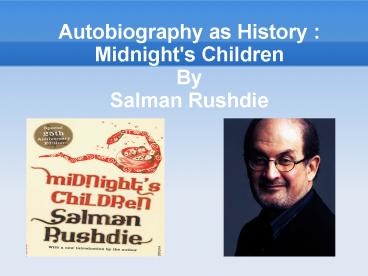Autobiography as History : Midnight's Children By Salman Rushdie
1 / 19
Title:
Autobiography as History : Midnight's Children By Salman Rushdie
Description:
Autobiography as History : Midnight's Children By Salman Rushdie The Author Born in Bombay in June, 1947 Studied in Cathedral School, Bombay Left for England in 1961 ... –
Number of Views:2361
Avg rating:3.0/5.0
Title: Autobiography as History : Midnight's Children By Salman Rushdie
1
Autobiography as History Midnight's
ChildrenBySalman Rushdie
2
The Author
- Born in Bombay in June, 1947
- Studied in Cathedral School, Bombay
- Left for England in 1961
- Completed schooling at Rugby
- Degree in History from King's College, Cambridge
- Worked with a multimedia theatre group and an
advertising company
3
The Book
- The tale of Saleem Sinai an individual born at
the exact instant of India's independence - The tale of post-colonial India
- Connection between the two allegorical and
literal. e
4
The Themes
- Magical Realism
- characterized by an equal acceptance of the
ordinary and the extraordinary - One Hundred Years of Solitude by Gabriel García
Márquez a classic of this Genre - Autofiction Fictional (?) Autobiography
- Life narrative presented as metaphor for a
nation's journey - Trivializing/Personalizing History
5
Salman and Saleem
- Saleem Sinai born on 15th August 1947 Salman
Rushdie born on 19th June, 1947 - It was a family joke that the British left only
two months after my arrival - Very similar parent profiles
- Like Saleem, Rushdie's maternal grandfather was
officially Muslim, but was an agnostic
6
Salman and Saleem
- When Salman was a child, the Rushdie family lived
in a colonialist estate called Windsor Villa
which probably served as a model for Methwold's
Estate - Like Saleem, Salman had a nanny called Mary.
- The young Salman Rushdie also believed he was the
center of the universe. - Being the only son and eldest child in a
middle-class Indian family does make you tend to
think that the world revolved around you
7
Salman and Saleem
- One major difference Rushdie was sent to
England at the age of 14 and has lived in England
ever since - Saleem Sinai lived all his life in the
sub-continent. - Saleem's Indianness is a function of Rushdie's
Britishness - Previous political novels Waiting for the Mahatma
and Kanthapura were focussed on the village/town
than the nation
8
Autobiography as History
- Saleem's personal story inextricably linked to
the story of India - Various narrative devices used to establish this
connection - Timing and Circumstances of births used as
powerful metaphors - Traits of individual matched with the nation
- Various historical events linked with Saleem's
friends and family
9
Birth Pangs
- "I had been mysteriously handcuffed to history,
my destinies indissolubly chained to those of my
country" - But that's not all!
- 1000 other children born at the same instant
represent India's post-independence generation
and the power it had
10
(More) Birth Pangs
- Saleem's child born at midnight of the day when
Emergency was imposed in India - Parvati's 13-day labour gt the 13 day of
political turmoil preceding Emergency - Nightmarish parallels between the travails of
India and Parvati
11
- come on Parvati, push, push, push and while
Parvati pushed in the ghetto, J . P. Narayan and
Morarji Desai. . . . were forcing Mrs. Gandhi to
push. . . . the Prime Minister was giving birth
to - a child of her own. . . . suspension of civil
rights, and censorship-of-the-press, and
armoured-units-on-special-alert, and
arrest-of-subversive-elements.
12
The Individual..and the Collective
- Only individuals in typical Historical texts
Kings and Emperors. - What about the common man?
- Attempt to present history through the
autobiography of a comman man
13
- I have watched the mountains being born I have
seen Emperors die . . . I saw that Isa, that
Christ, when he came to Kashmir. Smile, smile, it
is your history I am keeping in my head. - Tai is accorded the central place in the
narrative.
14
History Comes Home
- Rushdie shows history's momentous often violent
events as having trivial causes linked to his
family and friends. - Language riots in Bombay
- Emergency imposed by the Widow
- Murder of Homi Catrack by the husband of Lila
Sabarmati (remember the Nanavati case?) - Theft of the Prophet's Hair
15
History Comes Home
- Family members and friends are closely linked to
historical/political figures - Salim's uncle Zulfikar is a Pakistani General who
helps Ayub Khan seize power - Salim's mother first married to Shaikh Abdullah's
right hand man
16
The Magic in Reality
- Fantastical occurrences included in the real
world and presented as normal events - The powers of Salim and other midnight's children
- Narlikar's luminescent ashes and Ahmed's fading
skin - The view of history centered around Salim and his
family
17
The Magic In Reality
- I was born in the city of Bombay...once upon a
time. - Is the presence of 'magical' events a metaphor
for the role of religion in the Indian society? - Is it present to pander to the West's view of
India as a country of tantriks and yogis?
18
Points to Ponder
- The troubles of Salim and Midnight Children
symbolize the troubles of post-independence India - Rushdie blames the system.
- But what did the children, with their special
powers and abilities do to change/overcome the
system? - Does this inaction symbolizes our lethargy to
carve our own destiny?
19
Thank You
- Questions?

